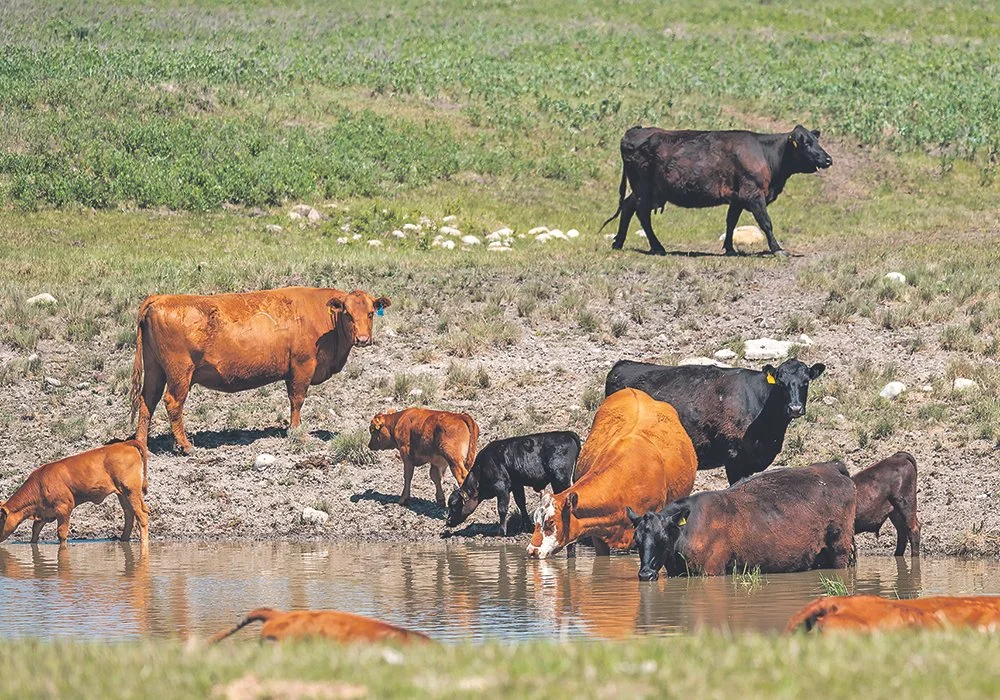Deborah McGregor is an internationally celebrated scholar and Canada Research Chair in Indigenous Environmental Justice. She joins UCalgary from York University, where she was cross-appointed to the Osgoode Hall Law School and the Faculty of Environment and Urban Change. As the CERC in Indigenous Ways of Climate and Water Sustainability for Planetary Health and Well-being, McGregor will generate understanding of, and build support for, Indigenous leadership in Earth-based reconciliation and justice, focusing on climate change as the overriding symptom of the planetary health crisis.
UCalgary awarded 2 prestigious Canada Excellence Research Chairs
Deborah McGregor is an internationally celebrated scholar and Canada Research Chair in Indigenous Environmental Justice. She joins UCalgary from York University, where she was cross-appointed to the Osgoode Hall Law School and the Faculty of Environment and Urban Change. As the CERC in Indigenous Ways of Climate and Water Sustainability for Planetary Health and Well-being, McGregor will generate understanding of, and build support for, Indigenous leadership in Earth-based reconciliation and justice, focusing on climate change as the overriding symptom of the planetary health crisis.
Cattle struggles deepen in Alberta
A second rural municipality in Alberta has declared an agricultural disaster because of drought this spring as beef producers head into summer, a period typically of less rain. “We haven’t seen the total effects of the drought,” said Stan Schulmeister, reeve of the County of Paintearth east of Red Deer. “But the agricultural producer that’s strictly dealing with livestock is going to find it very difficult to find feed this year because it’s almost province-wide, the damage to the hay crop and so on.”
Conservation leaders join forces on largest private grassland project in Canadian history
The Nature Conservancy of Canada (NCC) and Ducks Unlimited Canada (DUC) are working together to conserve one of the largest remaining tracts of intact Prairie grasslands and wetlands in Canada. McIntyre Ranch, located south of Lethbridge, will be conserved through an agreement (conservation easement) between the landowners and the two organizations. This 130-year-old ranch is one of the largest private landholdings in Canada, and spans over 22,000 hectares — an area more than a quarter the size of Calgary.
Nature Conservancy of Canada touts plan to protect 5,000 square km of Prairie grasslands
"They provide a lot of what we call ecosystem services," he said. "So, they provide a lot of benefit to everyday Canadians' lives, even if you don't live or work in the grasslands." They store and filter water, preventing both floods and droughts. They improve water quality. They keep soil in place, because of extensive root networks, so there's less erosion along lakes and rivers.
Alberta irrigation district faces lack of water, again
The Lethbridge Northern Irrigation District (LNID), is facing hurdles at getting water to its users across the district for the second year in a row. The LNID, which serves approximately 200,000 acres of irrigated cropland and provides water for much of Alberta’s “feedlot alley,” the largest concentration of cattle in Canada, has been shut off due to a break at the main canal.
First Nations group in Alberta say program to clean up tarsands is ‘underfunded’
“It’s definitely a concern expressed by community members seeing changes in water, traditional foods and changes in their health. “More data and information is necessary to answer these questions… but there are toxic sludge and tailings ponds here… these leak into the watershed,” said Lepine. Last summer, APTN News reported on a story where Keepers of the Water, an Indigenous environmental group, raised alarm over the proposed dumping of treated tailings pond water from the Alberta oil industry into the Athabasca River.
Hundreds attend irrigation conference in Lethbridge
The 2023 Irrigated Crop Production Update conference included presentations from over one dozen speakers, with topics ranging from updates to irrigation projects, climate change, water quality, scholarships, crop nutrients, and more. The event was the first of its kind since early 2020 and was hosted by Lethbridge College. Senior Research Chair at Lethbridge College Willemijn Appels says it was great to see so many people with different areas of expertise be able to share their knowledge and research with one another.
Lethbridge voted number one for best tasting water
Lethbridge has been crowned the winner for the best tasting water. Out of nine competing cities at the 2022 American Water Works Association Western Canada Conference, Lethbridge was chosen as number with Jasper and St. Albert coming in behind. An official with the city explains the secret behind the best tasting water. “It’s purely a subjective competition. They have a panel of people that are tasting and sniffing the entries. Some of the things they’re looking for is whether there’s an aftertaste, a chemical aftertaste, or whether there’s an odor that might impact customers experience,” said Doug Kaupp, General Manager of Waster & Wastewater for the city of Lethbridge.
UPDATE: Boil water advisory affecting handful of Mînî Thnî homes lifted
A boil water advisory that was affecting between eight and 12 households in Mînî Thnî has been lifted as of Oct. 15. Indigenous Services Canada posted the boil water advisory Oct. 11 as a precautionary measure in lieu of planned maintenance at the East Morley Water Treatment Plant, separate from the main plant supplying water to the townsite. Simon Sihota, regional manager of environmental public health for Indigenous Services Canada in Alberta, said the work involved replacing older pipes and distribution headers within the treatment plant, which involved taking the water plant offline and depressurizing the system.











